GOP waits on Donald Trump as clock ticks toward partial shutdown

The fight over President Donald Trump‘s $5 billion wall funds deepened Monday, threatening a partial government shutdown in a standoff that has become increasingly common in Washington. It wasn’t always like this, with Congress and the White House at a crisis over government funding. The House and Senate used to pass annual appropriation bills, and the president signed them into law. But in recent years the shutdown scenario has become so routine that it raises the question: Have shutdowns as a negotiating tool lost their punch? Monday brought few signs of progress. A partial shutdown that could occur at midnight Friday risks disrupting government operations and leaving hundreds of thousands of federal employees furloughed or working without pay over the holiday season. Costs would be likely in the billions of dollars. Trump was meeting with his team and getting regular updates, said White House spokeswoman Sarah Huckabee Sanders. Trump was also tweeting Monday to keep up the pressure. Exiting a Senate Republican leadership meeting late Monday, Sen. John Thune of South Dakota said, “It looks like it probably is going to have to build for a few days here before there’s a solution.” The president is insisting on $5 billion for the wall along the southern border with Mexico, but he does not have the votes from the Republican-led Congress to support it. Democrats are offering to continue funding at current levels, $1.3 billion, not for the wall but for fencing and other border security. It’s unclear how many House Republicans, with just a few weeks left in the majority before relinquishing power to House Democrats, will even show up mid-week for possible votes. Speaker Paul Ryan’s office had no update. Many Republicans say it’s up to Trump and Democrats to cut a deal. Senate Majority Leader Mitch McConnell and Trump talk most days, but the senator’s spokesman would not confirm if they spoke Monday about a plan. McConnell opened the chamber hoping for a “bipartisan collaborative spirit” that would enable Congress to finish its work. “We need to make a substantial investment in the integrity of our border,” McConnell said. “And we need to close out the year’s appropriation process.” Meanwhile more than 800,000 government workers are preparing for the uncertainty ahead. The dispute could affect nine of 15 Cabinet-level departments and dozens of agencies, including the departments of Homeland Security, Transportation, Interior, Agriculture, State and Justice, as well as national parks and forests. About half the workers would be forced to continue working without immediate pay. Others would be sent home. Congress often approves their pay retroactively, even if they were ordered to stay home. “Our members are asking how they are supposed to pay for rent, food, and gas if they are required to work without a paycheck,” said a statement from J. David Cox, Sr., president of the American Federation of Government Employees, the large federal worker union. “The holiday season makes these inquiries especially heart-wrenching.” Many agencies, including the Pentagon and the departments of Veterans Affairs and Health and Human Services, are already funded for the year and will continue to operate as usual, regardless of whether Congress and the president reach agreement this week. Congress already approved funding this year for about 75 percent of the government’s discretionary account for the budget year that began Oct. 1. The U.S. Postal Service, busy delivering packages for the holiday season, wouldn’t be affected by any government shutdown because it’s an independent agency. Trump said last week he would be “proud” to have a shutdown to get Congress to approve a $5 billion down payment to fulfill his campaign promise to build a border wall. During his 2016 presidential campaign, Trump promised that Mexico would pay for the wall. Mexico has refused. Democratic leaders Chuck Schumer and Nancy Pelosi, in a meeting last week at the White House, suggested keeping funding at its current level, $1.3 billion, for improved fencing. Trump had neither accepted nor rejected the Democrats’ offer, telling them he would take a look. Schumer said Monday he had yet to hear from Trump. Speaking on the Senate floor, Schumer warned that “going along with the Trump shutdown is a futile act” because House Democrats would quickly approve government funding in January. “President Trump still doesn’t have a plan to keep the government open,” Schumer said Monday. “No treat or temper tantrum will get the president his wall.” One option for lawmakers would be to provide stopgap funding for a few weeks, until the new Congress convenes Jan. 3, when Pelosi is poised to become House speaker. Wyoming Sen. John Barrasso, who is in line to become the No. 3 Republican in the Senate, suggested a stopgap bill could be one way to resolve the issue or a longer-term bill that includes money for border security. GOP leaders, though, were frustrated as the clock ticked away. Leaving the weekly leadership meeting, Sen. Roy Blunt, R-Mo., said any planning was a “very closely held thing. That’s why we should never let this happen. We should pass the bills the way we’re supposed to pass them.” Republished with permission from the Associated Press.
White House digs in on border wall demand, risking shutdown
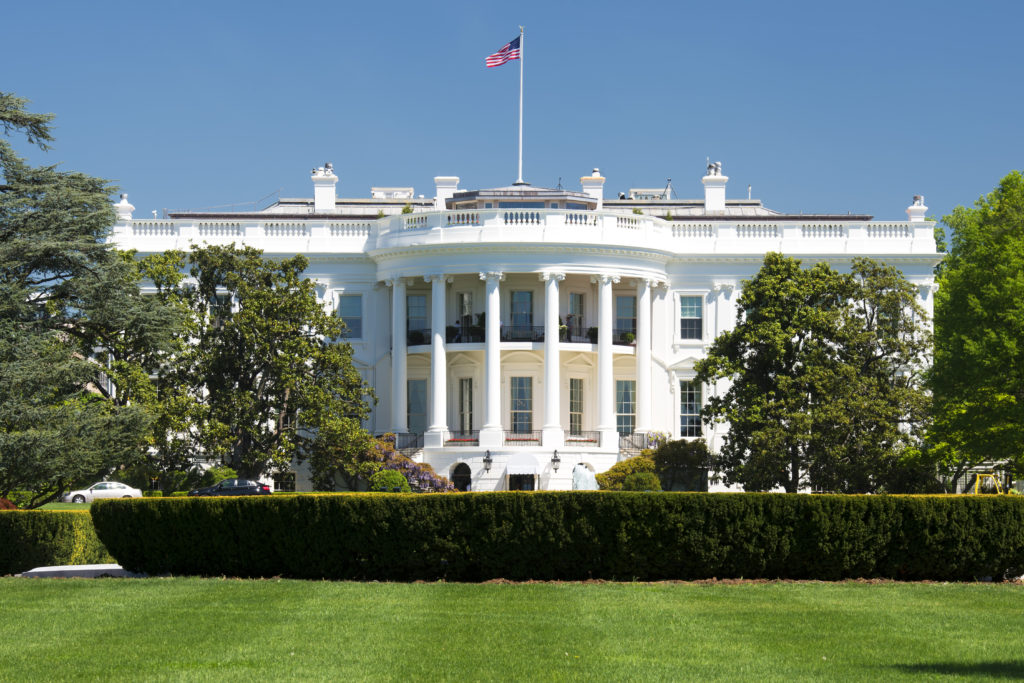
The White House on Sunday pushed the federal government closer to the brink of a partial shutdown later this week, digging in on its demand for $5 billion to build a border wall as congressional Democrats stood firm against it. “We’re going to do whatever is necessary to build the border wall to stop this ongoing crisis of illegal immigration,” said White House senior adviser Stephen Miller. Asked if that meant having a government shutdown, he said: “If it comes to it, absolutely.” Trump said last week he would be “proud” to have a shutdown to get Congress to approve a $5 billion down payment to fulfill his campaign promise to build a wall on the U.S.-Mexico border. But the president doesn’t have the votes from the Republican-controlled Congress to support funding for the wall at that level. Democratic congressional leaders, Sen. Chuck Schumer and Rep. Nancy Pelosi, have proposed no more than $1.6 billion, as outlined in a bipartisan Senate bill. The money would not go for the wall but for fencing upgrades and other border security. Democrats also offered to simply keep funding at its current level, $1.3 billion. Showing no signs of budging, Schumer said Sunday that it was up to Trump to decide whether parts of the federal government shut down at midnight Friday over his border wall, sending thousands of federal employees home without pay during the holidays. About one-quarter of the government would be affected, including the departments of Homeland Security, Transportation, Agriculture, State and Justice, as well as national parks. “He is not going to get the wall in any form,” Schumer said. Both parties in Congress have suggested that Trump would likely need to make the next move to resolve the impasse. The House is taking an extended weekend break, returning Wednesday night. The Senate returns Monday after a three-day absence. Trump had neither accepted nor rejected the Democrats’ proposal as of Friday, according to the Democrats, telling them he would take a look. Trump will need Democratic votes either way, now or in the new year, for passage. Wyoming Sen. John Barrasso, the No. 3 Republican in the Senate, said Republicans remain hopeful they can come up with a proposal that can be acceptable to Trump and pass both chambers. He suggested that could take the form of a stopgap bill that extends funding until January, or a longer-term bill that includes money for border security. “There are a lot of things you need to do with border security,” he said. “One is a physical barrier but also the technology, the manpower, the enforcement, all of those things, and our current laws are in some ways an incentive for people to come to this country illegally, and they go through great risk and possibly great harm.” Sen. Susan Collins, R-Maine, urged senators to revisit a bill she helped push earlier this year that would provide $2.5 billion for border security, including physical barriers as well as technology and border patrol agents. “There’s absolutely no excuse to shut down government on this issue or any other issue,” she said. Schumer declined to say whether Democrats would be willing to consider proposals other than the two options that he and Pelosi offered. Republicans “should join us in one of these two proposals, which would get more than enough votes passed and avoid a shutdown,” Schumer said. “Then, if the president wants to debate the wall next year, he can. I don’t think he’ll get it. But he shouldn’t use innocent workers as hostage for his temper tantrum.” Miller and Barrasso spoke on CBS’ “Face the Nation,” Schumer appeared on NBC’s “Meet the Press,” and Collins was on ABC’s “This Week.” Republished with permission from the Associated Press.
Donald Trump says military to build border wall if Democrats refuse

President Donald Trump sought Tuesday to pressure Democratic congressional leaders into supporting his demand for billions of dollars to build his promised wall along the U.S.-Mexico border, threatening to have the military build it “if Democrats do not give us the votes to secure our Country.” Trump tweeted the threat hours before Senate Democratic Leader Chuck Schumer and House Democratic Leader Nancy Pelosi were to meet with Trump at the White House in an effort to avert a possible partial government shutdown on Dec. 21, when funding for some agencies is scheduled to expire. In a series of tweets Tuesday, Trump said immigration and border patrol agents and thousands of active-duty service members he sent to the border have done a “FANTASTIC” job. But he said “A Great Wall would be, however, a far easier & less expensive solution.” Trump said he looked forward to meeting with Schumer and Pelosi, but claimed they don’t want border security for “strictly political reasons.” “If the Democrats do not give us the votes to secure our Country, the Military will build the remaining sections of the Wall. They know how important it is!” Trump said. Schumer and Pelosi said Monday that Republicans have the power to keep the government open since they control Congress and the White House. “Our country cannot afford a Trump Shutdown,” they said in a statement, adding that Trump “knows full well that his wall proposal does not have the votes to pass the House and Senate and should not be an obstacle to a bipartisan agreement.” Republican congressional leaders have repeatedly said it’s up to Trump to cut a deal with Democrats, an acknowledgment of their inability to produce spending bills with Republican votes alone. That gives Democrats some momentum heading into the closed-door talks, which also could veer into Trump’s request for emergency funding for deadly wildfires in California and a Republican-sponsored bill to extend expiring tax breaks and delay some health care taxes. Before lawmakers adjourn for the year they also may consider a bipartisan criminal justice reform bill, a bill to protect special counsel Robert Mueller and a plan to overhaul the system for handling sexual harassment complaints on Capitol Hill. By far, the biggest unresolved issue is the border wall. Trump wants the next funding package to include at least $5 billion for it, an idea Democrats have flatly rejected. Pelosi and Schumer have urged Trump to support a bill that includes a half-dozen government funding bills largely agreed upon by lawmakers, along with a separate measure that funds the Department of Homeland Security at current levels through Sept. 30. The homeland bill includes about $1.3 billion for fencing and other security measures at the border. If Trump rejects that, Democrats will likely urge a continuing resolution that funds all the remaining appropriations bills at current levels through Sept. 30, an aide said. The aide was not authorized to discuss strategy by name and requested anonymity. Trump said Friday that Congress should provide all the money he wants for the wall and called illegal immigration a “threat to the well-being of every American community.” At an appearance in Kansas City, Missouri, Trump accused Democrats of playing a political game and said he ultimately would win. “I actually think the politics of what they’re doing is very bad for them,” Trump said of Democrats. “We’re going to very soon find out. Maybe I’m not right. But usually I’m right.” Pelosi, who is seeking to become House speaker when the new Congress convenes in January, said she and many other Democrats consider the wall “immoral, ineffective and expensive” and noted that Trump promised during the 2016 campaign that Mexico would pay for the wall, an idea Mexico has repeatedly rejected. Protecting borders “is a responsibility we honor, but we do so by honoring our values as well,” Pelosi said last week. Schumer said Democrats want to work with Trump to avert a shutdown, but said money for border security should not include the concrete wall Trump has envisioned. Instead, the money should be used for fencing and technology that experts say is appropriate, Schumer said. “We do not want to let a Trump temper tantrum govern our policies or cause the shutdown of a government, which everyone on both sides of the aisle knows is the wrong idea,” Schumer said. If Trump “wants to shut down the government over Christmas over the wall, that’s his decision,” he said. Vermont Sen. Patrick Leahy, the top Democrat on the Senate Appropriations Committee, said Trump is the only obstacle between fully funding the government and a shutdown. “Time and again, President Trump has used the government of the American people as a bargaining chip for his fabricated solution to his manufactured crisis,” Leahy said Monday in a Senate speech. Trump “wants to score a made-for-reality-TV moment and he doesn’t care how many hardworking Americans will suffer for it,” Leahy said. “This is not about border security. This is about politics, pure and simple.” House Majority Whip Steve Scalise, R-La., said Democrats were the ones playing politics. If there’s a better way to secure the border than the $5 billion plan Trump has laid out, Democrats “need to come with an alternative,” Scalise said Monday on Fox News Channel. “They can’t come and say they want to shut the government down for no reason because they don’t want border security. They’ll lose that argument with the American people.” Republished with permission from the Associated Press.
Bradley Byrne looks to fund Trump’s border wall through budget reconciliation process

Alabama 1st District U.S. Congressman Bradley Byrne announced Monday he has introduced legislation that would help President Donald Trump secure the necessary funding to build the border wall with Mexico. Byrne’s bill, H.R. 7073, better known as the 50 Votes for the Wall Act, would use the budget reconciliation process secure the necessary $25 billion needed to build the wall, which would side-step a threatened filibuster by Senate Democrats. Budget reconciliation allows bills to pass out of the Senate with only 50 votes, while almost all other Senate bills require 60 votes. Budget reconciliation was the same process used to pass tax reform last year. The bill would also fully fund the border wall, eliminating the possibility that Democrats could bottle up funding in future appropriations bills, and direct the Secretary of Homeland Security to finalize construction before the beginning of President Trump’s second term. “Border security is national security, and we cannot allow Democrats to continue to block our efforts to build a wall along our southern border,” explained Byrne. “That is why I am introducing the 50 Votes for the Wall Act, which creates a process to overcome the Democrat obstruction and move forward with plans to construct President Donald Trump’s border wall. He continued, “Sixty-three million Americans voted for President Trump with the promise of building a wall because they want us to finally secure our borders. With the 50 Votes for the Wall Act, we can make the wall a reality and ensure the safety of the American people.” The bill would create Border Wall and Security Trust Fund, allowing it to be filled with up to $25 billion “out of any money in the Treasury not otherwise appropriated, such sums as the Secretary of Homeland Security may request of the Secretary of Treasury on or after October 1, 2018,” reads the bill’s text. The authority for the trust fund will be terminated on September 30, 2028. The unobligated balance of any amounts fund on such date will be returned to the general fund of the Treasury. Byrne’s bill has earned the support of Federation for American Immigration Reform (FAIR), a leading immigration reform organization. “Even though President Trump and Congressional Republicans have a clear mandate from the American people, Democrat obstructionists have repeatedly blocked border wall funding and are once again threatening to do so in December,” said AIR Government Relations Director RJ Hauman. “This is why it is important to pursue other avenues to ensure that the border wall is funded once and for all. One such avenue is Congressman Bradley Byrne’s Fifty Votes for the Wall Act – which provides a unique and filibuster-proof funding mechanism for the border wall. FAIR applauds Congressman Byrne for introducing this legislation, and recognizing that Democrat obstruction poses a significant national security risk.” Congressman Byrne’s bill is sponsored by fifteen of his Republican colleagues, including two fellow members of the Alabama delegation: 5th District U.S. Rep. Mo Brooks and 3rd District U.S. Rep. Mike Rogers. Other sponsors include U.S. Reps. Kevin Cramer (R-ND), Michael Burgess (R-TX), Francis Rooney (R-FL), Brian Babin (R-TX), Jim Banks (R-IN), Paul Gosar (R-AZ), Matt Gaetz (R-FL), Ralph Norman (R-SC), Andy Biggs (R-AZ), Bill Posey (R-FL), Alex Mooney (R-WV), Scott DesJarlais (R-TN), and Lamar Smith (R-TX).
Donald Trump revives fiery immigration talk for ‘caravan’ election

Donald Trump fueled his 2016 campaign with fiery immigration rhetoric, visions of hordes flowing across the border to assault Americans and steal their jobs. Now, in the final weeks before midterm elections, he’s back at it as he looks to stave off Democratic gains in Congress. It’s an approach that offers both risks and rewards. He could energize Democratic foes as well as the Republicans he wants to rouse to the polls. But for the president, the potential gains clearly win out. In campaign stops and on Twitter in recent days, he has seized on a huge caravan of Central American migrants trying to reach the United States through Mexico as fresh evidence that his tough immigration prescriptions are needed. He tweeted that the caravan was an “assault on our country at our Southern Border.” Then, Thursday night in Montana, he told cheering supporters, “This will be an election of Kavanaugh, the caravan, law and order and common sense. … Remember it’s gonna be an election of the caravan.” His assertions got a visual boost Friday when some members of the caravan broke through a Guatemalan border barrier with Mexico. A few then got through to Mexican territory, but most were repelled by police with riot shields and pepper spray. On an aggressive campaign blitz, Trump has sought to cast the midterms as a referendum on his presidency, believing that he must insert himself into the national conversation in order to bring Republicans out to vote. Perhaps no issue was more identified with his last campaign than immigration, particularly his much-vaunted — and still-unfulfilled — promise to quickly build a U.S.-Mexico border wall. To Trump, his pledges are still rallying cries. “I think it’s a big contrast point. All the Democrats are refusing to build the wall. It’s a good contrast,” said former Trump campaign aide Barry Bennett, who said the caravan was “perfectly timed” for Trump’s midterm pitch. But some warn that as Trump seeks to pump up his base, he could energize opposition. Matt Barreto, co-founder of the research firm Latino Decision, said an elevated immigration message could hurt Trump, too. “I think you run the risk of angering minority voters across the board, Latino, black and Asian-Americans and also alienating and distancing from whites, including conservatives and moderates, now that they see what’s happening with the family separations,” said Barreto, a professor at the University of California, Los Angeles. Thursday night, the migrant caravan of at least 3,000, many waving Honduran flags and chanting slogans, arrived at the Guatemalan border with Mexico. On Friday, they broke down Guatemalan gates and streamed toward a bridge to Mexico. Most were repelled by Mexican police, but about 50 got through. Mexico’s dispatching of additional police to its southern border seemed to please Trump. On Thursday night, he retweeted a BuzzFeed journalist’s tweet of a video clip showing the police deployment, adding his own comment: “Thank you Mexico, we look forward to working with you!” Earlier in the day, Trump railed against the caravan on Twitter and declared it was “Democrats fault for weak laws!” He also threatened to deploy the military to the border if Mexico did not stop the migrants and appeared to threaten a revamped trade deal with Canada and Mexico. Until days ago, immigration appeared to be unlikely to repeat its central role of 2016, as Trump heeded congressional Republican requests to avoid a government shutdown over funding for the border wall ahead of the midterms. And an internal GOP poll presented to the White House last month found that other issues — particularly opposing the “Medicare for All” policy of some Democrats — would better resonate with voters. While Trump did focus for a time on some Democrats calling for the abolition of the Immigration and Customs Enforcement agency, he largely discussed it as a warning against Democratic control of Washington. But the renewed embrace of the polarizing issue reflects a consensus view in both parties that control of Congress will be determined more by turning-out party loyalists than winning over centrist voters. A vigorous immigration push will likely be well-received in many of the deep-red areas where Trump is campaigning, like his stop in Montana Thursday night. Republicans acknowledge it could play differently in other parts of the country — and might even harm GOP candidates in some selected districts — but they are wagering that as in 2016 it is still a net-win issue for the president’s party. Trump campaigns Friday night in Arizona, an increasingly competitive state where the message could have a mixed result. He won Arizona by 3.5 percentage points two years ago, compared with Republican Mitt Romney’s 9-point margin in 2012. Ahead of the midterms, polls continue to show that voters consider immigration among the most important issues, though generally falling behind the economy and health care. However, Republican and Democratic voters have distinctly different views of immigration as a problem facing the country. A recent Pew Research Center survey found a majority of Democratic voters — 57 percent — think the treatment of immigrants in the country illegally is a very big problem in the U.S., compared with just 15 percent of Republican voters who say the same. By contrast, three-quarters of Republican voters call illegal immigration a very big problem, ranking the highest for Republicans among the long list on Pew’s survey, while just 19 percent of Democratic voters say the same. Recently, surveys from CNN and The Washington Post/ABC News found voters were slightly more likely to think the Democratic Party would do a better job handling immigration than the Republican Party. Republished with permission from the Associated Press.
Misleading tweets by liberal activists fuel Donald Trump
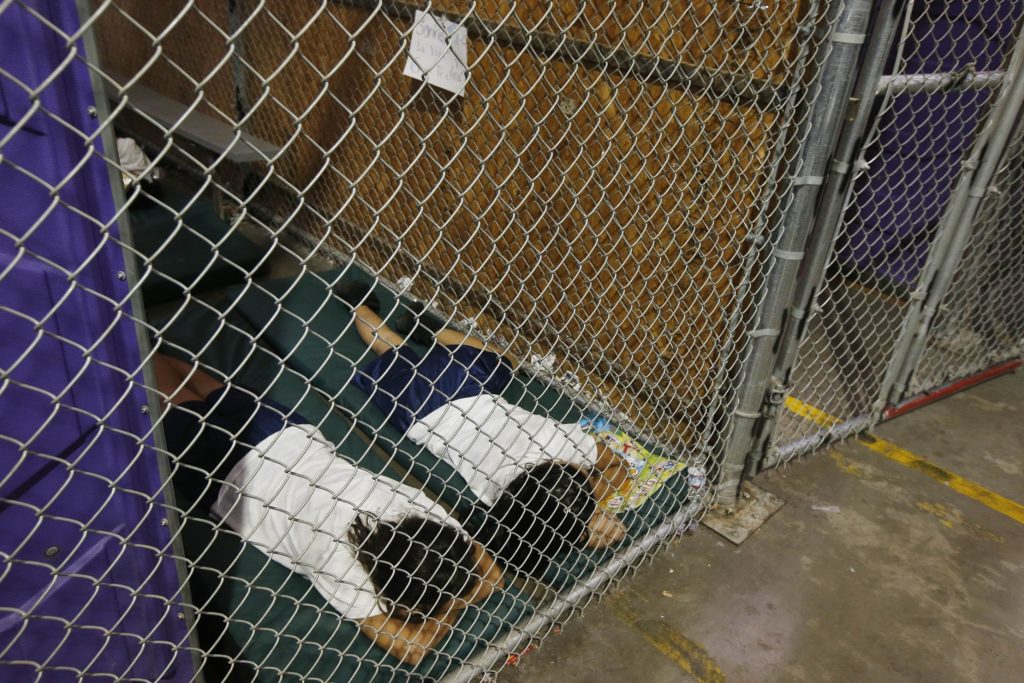
President Donald Trump has seized on an error by liberal activists for tweeting photos of detainees at the U.S.-Mexico border in steel cages and blamed the current administration for separating immigrant children from their parents. The photos were taken by The Associated Press in 2014, when President Barack Obama was in office. Trump tweeted early Tuesday: “Democrats mistakenly tweet 2014 pictures from Obama’s term showing children from the Border in steel cages. They thought it was recent pictures in order to make us look bad, but backfires. Dems must agree to Wall and new Border Protection for good of country…Bipartisan Bill!” The Trump administration has come under fire for its immigration enforcement policies, which critics say will unnecessarily separate children from their parents at the border. Republished with permission from the Associated Press.
Donald Trump: No immigration deal unless ‘real wall,’ good security
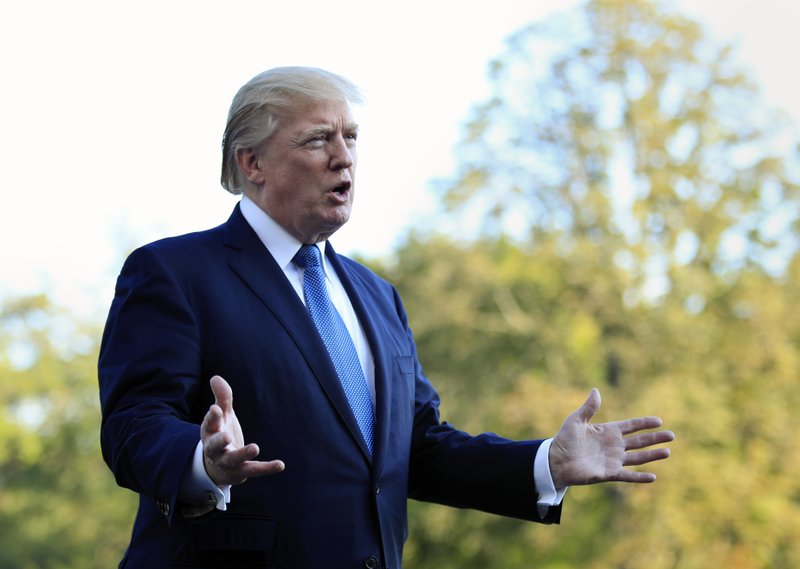
President Donald Trump said he opposes any immigration legislation that doesn’t include “a real wall” along the Mexican border and “very strong border security.” Moderate House Republicans are pushing a deal that could lead to citizenship for young “Dreamer” immigrants brought to the U.S. illegally. But Trump told “Fox & Friends” in an interview that aired Thursday that unless a bill “includes a wall, and I mean a wall, a real wall, and unless it includes very strong border security, there’ll be no approvals from me.” Trump said the United States had “the worst immigration laws in the entire world by far” and said he wanted a comprehensive deal that included all of his priorities. “I think it’s time to get the whole package,” he said. Trump’s comments, taped Wednesday, came as immigration talks are underway among House Republicans, with moderates seeking a way for hundreds of thousands of young immigrants to stay permanently in the U.S. But conservatives say they have no interest in awarding what they call “amnesty” to people who came illegally. Moderates trying to force votes on the issue gained their 21st GOP signature Wednesday. With just four more, they should be able to overcome leadership objections and have votes on immigration bills in late June. House leaders plan a pivotal closed-door GOP immigration meeting on June 7. Trump also took issue with the immigration court system, saying other countries have “security people” who “stand there and say you can’t come in” rather than judges who decide immigration claims. “Whoever heard of a system where you put people through trials? … We’re going to change the system,” Trump said. The administration is dealing with an enormous number of immigration cases along the U.S.-Mexico border, as a sharp increase in deportation arrests under Trump has pushed the backlog above 650,000 cases. Attorney General Jeff Sessions, who oversees immigration courts, has sought major changes to the long-clogged courts. The Justice Department recently announced that more prosecutors and judges will be assigned to help whittle away at the caseload. And the administration has also introduced production quotas for immigration judges, raising concern among judges and attorneys that decisions may be unfairly rushed. Republished with permission from the Associated Press.
Paul Ryan vents frustration over GOP infighting over immigration

A frustrated Speaker Paul Ryan chided House Republicans for election-season infighting over immigration that sank the party’s farm bill last week, participants in a closed-door meeting said Tuesday. Leaders said they will schedule a late- June showdown over immigration, an issue that has divided the GOP for years. “I think he said ‘gee whiz’ and ‘gosh’ and used the word ‘crap’ once,” Rep. Mark Amodei, R-Nev., said of Ryan’s remarks to his colleagues. “For Paul Ryan, ‘crap’ is pretty blue language.” At a news conference minutes later, the Wisconsin Republican criticized anew an effort by GOP moderates to force votes on immigration by collecting signatures from a majority of House members on a little-used procedure called a discharge petition. The centrists need just five more GOP signatures to prevail. “I can guarantee you a discharge petition will not make law,” Ryan said. That was a reference to the expectation that the votes moderates want to have would produce a bill that President Donald Trump would consider too weak and veto. Ryan also defended himself against calls from conservatives that he step down as speaker in the wake of the party’s anarchy over the farm bill and continuing disarray on immigration. Ryan will retire from the House after this year but has said he will remain as speaker until he leaves office. “Members drafted me into this job because of who I am and what I stand for,” he said. He was elected speaker in 2015 after conservatives pressured his predecessor, John Boehner, R-Ohio, to step aside. Asked if he would remain as speaker all year, he said, “Obviously I serve at the pleasure of the members.” He said Republicans should concentrate on the party’s legislative agenda and not have “a divisive leadership election.” Lawmakers exiting the GOP meeting said leaders told them the House would vote on immigration during the third week of June. They said it was unclear exactly what they would vote on. The centrist push for immigration votes is considered likely to result in passage of a middle-ground measure backed by a handful of Republicans and all Democrats. Ryan has said he will avert that outcome, though it’s unclear how, and many conservatives consider it intolerable. Conservative and moderate GOP leaders negotiated privately Monday over ways to win centrist support for a conservative-backed measure that for months has floundered short of the 218 Republican votes it would need for House passage. They discussed changes that would help young “Dreamer” immigrants brought to the U.S. illegally as children and immigrant farm workers stay longer in the U.S., said one lawmaker who described the private discussions on condition of anonymity. The conservative bill would currently reduce legal immigration, clear the way for construction of President Donald Trump’s border wall with Mexico and let Dreamers stay in the U.S. for renewable three-year periods. All Democrats oppose the measure and it would have no chance of clearing the more moderate Senate. The farm bill crashed last Friday, partly because of opposition by members of the hard-right House Freedom Caucus. They had refused a leadership offer for a vote on the conservative immigration bill in June, which they said was too late. Some members of the Freedom Caucus suggested it would be time for Ryan to step down should moderates prevail. “If we run an amnesty bill out of a Republican House, I think all options are on the table,” said Rep. Scott Perry, R-Pa., a member of the group, when asked if Ryan should remain as speaker if the moderates’ effort succeeds. Many conservatives say legislation protecting immigrants in the U.S. illegally from deportation is amnesty. Other Republicans said it seemed unlikely Ryan would abandon his post. They said potential successors including Majority Leader Kevin McCarthy, R-Calif., so far lack the GOP votes they’d need to win the job. The moderates need 218 signatures — a House majority — on a petition to force votes on immigration bills. With all 193 Democrats expected to sign, the moderates need five more than the 20 signatures they already have. If they succeed, a vote could occur no earlier than late June. Republished with the permission of the Associated Press.
Jeff Sessions to address immigration at border sheriffs meeting

As thousands of National Guard troops deploy to the Mexico border, U.S. Attorney General Jeff Sessions plans to bring his firm stance on immigration enforcement to New Mexico where a group of Southwest border sheriffs are meeting Wednesday. Sessions will speak in Las Cruces at the Texas Border Sheriff’s Coalition Annual Spring Meeting with the Southwestern Border Sheriff’s Coalition, which is made up of 31 sheriff’s departments from Texas, New Mexico, Arizona and California. Their counties are located within 25 miles (40 kilometers) of the U.S.-Mexico border. Immigrant rights activists promised to protest Sessions’ visit on Wednesday, as they rejected his past characterization of the border region during a 2017 visit to El Paso, Texas, as “ground zero” in the Trump administration’s fight against cartels, and human traffickers. “He treated our home like a war zone, referring to it as ‘ground zero,’” said Fernando Garcia, executive director of the Border Network for Human Rights in El Paso. “He was wrong then, and he is wrong now.” El Paso is some 50 miles (80 kilometers) south of Las Cruces. Sessions’ trip to Las Cruces, a city about an hour north of the border, comes as construction begins nearby on 20-miles (32-kilometers) of steel fencing that officials say is a part of President Donald Trump’s promised wall. U.S. Customs and Border Protection officials have described the new, heightened barrier as a structure that will be harder to get over, under and through than the old post and rail barriers that has lined the stretch of the border’s El Paso sector. Sessions has issued an order directing federal prosecutors to put more emphasis on charging people with illegal entry, citing a “crisis” on the border. A 37 percent increase in illegal border crossings in March brought more than 50,000 immigrants into the United States, which was triple the number of reported illegal border crossings in the same period last year. It was still far lower, however, than the surges during the last years of the Obama administration and prior decades. The attorney general’s “zero-tolerance” for border-crossing prosecutions calls for taking action against people who are caught illegally entering the United States for the first time. In the past, such offenses have been treated as misdemeanors. He also recently set quotas for immigration judges to reduce enormous court backlogs, saying they must complete 700 cases a year to earn a satisfactory grade. The quotas take effect Oct. 1. Republished with permission from the Associated Press.
Mo Brooks praises Donald Trump’s decision to use military along southern border
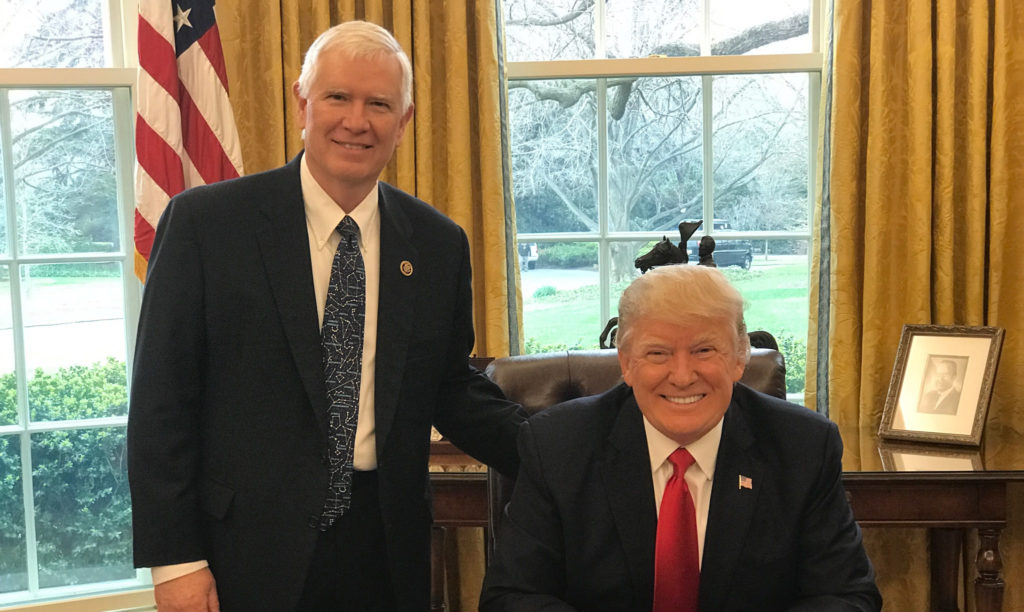
Alabama 5th District U.S. Congressman Mo Brooks says he fully supports President Donald Trump’s decision to use American troops to defend the nation’s southern border. Trump signed a memorandum on Wednesday to deploy the National Guard to the southwest border, following several days of his calling for more border security. Brooks shortly thereafter released a statement of support saying, “I fully support President Trump’s use of our military to secure the border against invasion by foreign nationals.” “Until Congress gives President Trump funding for the physical border wall, his decision to send troops to the border, consistent with his Constitutional power as commander in chief, not only sends a strong message to the world that our borders will be secure, but more importantly preserves America’s national sovereignty,” Brooks continued. The President also tweeted on Wednesday, “Our Border Laws are very weak while those of Mexico & Canada are very strong. Congress must change these Obama era, and other, laws NOW!..We will be taking strong action today.” Our Border Laws are very weak while those of Mexico & Canada are very strong. Congress must change these Obama era, and other, laws NOW! The Democrats stand in our way – they want people to pour into our country unchecked….CRIME! We will be taking strong action today. — Donald J. Trump (@realDonaldTrump) April 4, 2018 At the White House that afternoon, Trump spoke of his intention to deploy the National Guard to the southern border because of Congress’s failure to properly defend the nation against the invasion. “So, we are preparing for the military to secure our border between Mexico and the United States. We have a meeting on it with General Mattis and everybody, and I think it’s something we have to do,” said the President. Brooks agrees — it’s time to take action. “Recent, highly-publicized caravans of thousands of foreigners heading for America’s border emphasize that it is past time for Congress to reform laws that entice and reward foreign nationals who illegally invade America,” added Brooks. “For too long, illegal aliens have exploited weak laws and then sought and sometimes gained de facto permanent legal status at great cost and damage to American taxpayers.”
Last-gasp try for immigration deal fell to partisan disputes
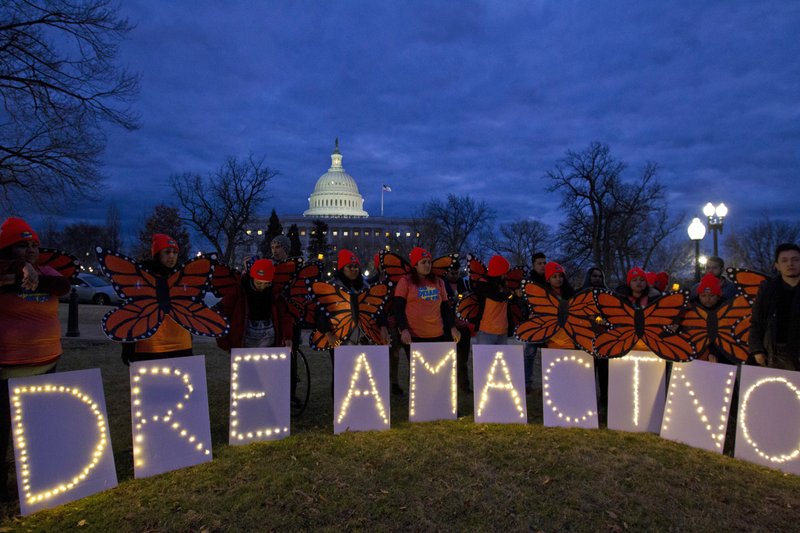
An effort to protect young Dreamer immigrants from deportation never really had much chance of squeezing into the last bill Congress must pass this election year. That’s why bargainers from both parties were surprised when the White House tried anyway. The catch: It was bait to win more money for President Donald Trump’s precious border wall with Mexico. The last-gasp White House attempt came as bargainers completed the huge spending measure that lawmakers aim to approve this week, participants and observers of the budget negotiations said Wednesday. The effort failed, and Trump ended up getting just $1.6 billion for his wall and other border security steps, a year’s worth of funds. That left prospects dim that Congress would act this year to renew the Deferred Action for Childhood Arrivals program, or DACA, as Democrats eyeing a potential House takeover in November’s elections become increasingly resistant to helping Trump build his wall. “Until they stop acting like idiots and stop trying to use Dreamers as hostages to pass their stupid xenophobic laws and stupid ideas like the border wall, nothing changes,” Rep. Ruben Gallego, D-Ariz., a member of the Congressional Hispanic Caucus, said Wednesday. Trump took a different view, expressed in a tweet late Wednesday: “Democrats refused to take care of DACA. Would have been so easy, but they just didn’t care. I had to fight for Military and start of Wall.” By one account, Trump began calling congressional GOP leaders two weeks ago saying he wanted long-term funding for his wall and would trade it for a short-term renewal of DACA. Trump ended the program last year, though federal judges have ordered the administration to keep renewing DACA’s two-year permits until legal challenges to Trump’s action are resolved. A different person said that in talks Sunday at the Capitol, White House officials said they wanted $25 billion — the full amount Trump has proposed for the wall — in exchange for extending DACA protections through September 2020. When Democrats countered that for that sum they wanted a chance at citizenship for 1.8 million immigrants in DACA, the White House turned it down and chances for a deal dissipated. The program, created by President Barack Obama, temporarily shields from deportation a group of immigrants brought to the U.S. illegally as children. The talks were described by aides and advocacy groups from both sides on condition of anonymity because the negotiations were conducted privately. Bargainers discussed trading a three-year DACA extension for three years of wall money, some sources said, or five for five. Some said the administration went further and also wanted Democrats to include more money for enforcement agents and beds for detained immigrants and include language making it easier to deport immigrants in gangs, steps they were unwilling to take. Even a simpler compromise — a DACA extension for wall money — has encountered opposition from both sides but internal divisions, too. Large numbers of Republicans don’t want to protect immigrants here illegally, period, and House Speaker Paul Ryan, R-Wis., has been reluctant to call a House vote on any proposal a GOP majority opposes. Other Republicans have wanted a deal, arguing that immigrants help the economy and booting hundreds of thousands of them who’ve lived here since childhood can be a damaging political problem in November. “We just blew a great opportunity to do something substantial on immigration,” said Sen. Lindsey Graham, R-S.C., who’s long sought a bipartisan deal on the issue. “I think the White House overplayed their hand.” Some Democrats say bringing any stability to immigrants perpetually worried about deportation would be worth the trade-off. But many despise the idea of helping Trump build his wall in exchange for a temporary reprieve for DACA immigrants. They also remember the first two months of this year when Trump seemed to embrace several efforts at compromise, only to walk away from them after conservatives objected. And they have bitter memories of White House opposition to a bipartisan plan that the Senate rejected last month after Trump’s Department of Homeland Security distributed a memo saying the proposal “ignores the lessons of 9/11” and would “be the end of immigration enforcement in America.” Sen. Angus King, I-Maine, said that statement was “not the way to communicate in this situation.” Republished with permission from the Associated Press.
Martha Roby: House takes steps to secure the southern border

Immigration was one of the most hotly debated issues during the last presidential election, so it’s no surprise that there continue to be significant developments on these policies. I wanted to provide an update and share some of the progress we’ve made in the House to change the course of our nation’s illegal immigration problem. As you probably know, the Trump Administration recently announced that it would end the Deferred Action for Childhood Arrivals (DACA) program. President Barack Obama established DACA in 2012 to allow undocumented immigrants who were brought to the United States as children to avoid deportation and obtain renewable work authorization. Since then as many as 800,000 individuals have been accepted into DACA. Whether you agree or disagree with the intention of the program, DACA was a blatantly unconstitutional abuse of executive power. Attorney General Jeff Sessions is right to phase out this program and allow Congress time to craft the appropriate policy in an orderly and constitutional manner. I believe our immigration policies should discourage illegal entry, not reward it. In addressing this problem, we must also recognize and sympathetic to the fact that these individuals were brought here as children and not of their own accord. This is just one of the many areas of immigration law that needs to be fixed, and I look forward to working with my Judiciary Committee colleagues to craft policies that restore the rule of law and promote America’s economic interests. When it comes to cracking down on illegal immigration, I believe most of us agree that we should start by targeting the dangerous criminals who put Americans at risk. That’s why I was proud to recently vote in favor of H.R. 3697, the Criminal Alien Gang Member Removal Act. This bill will amend the law to finally make a person’s history of involvement in a criminal gang grounds for inadmissibility into this country. This bill would also allow law enforcement agents to automatically detain and deport anyone found to be a criminal alien gang member. You might read this and wonder, “What gang violence?” The most notorious Latin American gang is known as MS-13. It began in the 1980s and has grown to an estimated 8,000 members in the United States. They have a violent history of organized crime in the areas of drug trafficking, kidnapping, human smuggling, sex trafficking, murder, assassinations, blackmail, and extortion. To paint a clear picture of just how violent MS-13 is, their motto is “Mata, Roba, Viola, Controla,” which translates to “Kill, Steal, Rape, Control.” If that isn’t enough to demonstrate the serious threat these individuals pose, MS-13 has been responsible for eight brutal murders in Northern Virginia alone just since last November. Our bill makes it crystal clear that criminal alien gang members are not welcome in this country, and if they should find themselves here, we are dedicated to getting them off the street. Also on the immigration front, the House took action to put a “down payment” on construction of a border wall. Our government-wide appropriations bill, the Make America Prosperous and Secure Appropriations Act, contains $1.6 billion for construction and security upgrades at the southern border. It is Congress’ responsibility to budget for national priorities, and securing the border is a top priority. We need bigger, stronger, and smarter barriers along our southern border, and that’s why our bill funds this down payment to begin construction. Immigration is a sensitive issue that many people on both sides of the argument have strong feelings about. There are no easy fixes, but I believe most Americans are ready for a sensible immigration system that promotes public safety, fairness, and economic growth. As a member of the Judiciary Committee, I will remain actively involved in this issue and I am optimistic we can continue to make real progress. ••• Martha Roby represents Alabama’s Second Congressional District. She lives in Montgomery, Alabama with her husband Riley and their two children.


